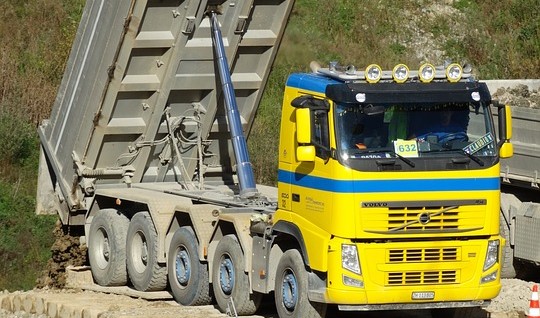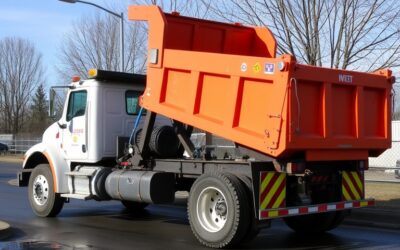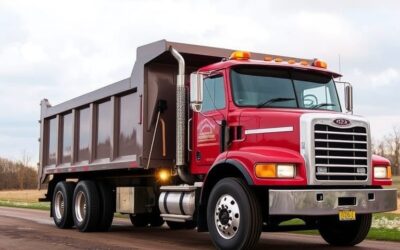Dump trucks play a crucial role in heavy-duty transport, but tipping is a serious safety risk that can lead to injuries, equipment damage, and project delays. Understanding the common causes of tipping and how to prevent them is crucial for anyone operating these heavy-duty vehicles.
One major risk is uneven load distribution. If a load is not evenly spread in the dump bed, it can create an imbalance that leads to tipping. Poor road conditions also contribute to instability. Potholes, soft ground, and uneven surfaces make it challenging to keep the truck stable, especially when carrying heavy loads. Operator error is another significant factor. Mistakes like driving too fast or making sharp turns can easily lead to a loss of balance.
Hydraulic system failures can also cause tipping. If the hydraulic system that raises the dump bed malfunctions, it can result in an unstable lift, increasing the risk of the truck tipping over. By identifying these risks and implementing effective prevention measures, you can enhance the safety and efficiency of your dump truck operations.
Stability First: Essential Tips for Dump Truck Operators
1. Uneven Load Distribution
Uneven load distribution is one of the top causes of dump truck tip-overs. When a load is not evenly spread in the dump bed, the truck’s balance is compromised, increasing the risk of tipping, especially when navigating turns or uneven terrain. To prevent tip-overs, it’s essential to load your truck correctly.
First, always spread the load evenly from front to back and side to side. This ensures that the weight is distributed evenly, keeping the center of gravity low and stable. Use tools like shovels or load levelers to achieve a balanced spread. Additionally, avoid overloading the truck, as this can further exacerbate balance issues.
Securing the load is also essential. Use tarps, nets, or other restraining devices to keep the material in place during transit. This prevents shifting, which can destabilize the truck. By paying attention to how the load is distributed and secured, you can minimize the risk of tipping due to uneven load distribution.
2. Poor Road Conditions
Bad road conditions are a leading risk for dump truck tipping. Potholes, soft ground, uneven surfaces, and steep inclines can all create an unstable driving environment. Heavy loads on bad roads make it even harder to keep your truck stable.
To mitigate this risk, plan your route carefully. Whenever possible, choose roads that are well-maintained and have a solid surface. Avoid roads that are known to have many potholes or soft ground. If you must drive on uneven terrain, reduce your speed and take extra precautions.
Make sure to conduct a pre-haul inspection of the route. Look for any potential hazards, such as steep inclines or tight turns, and plan how to navigate them safely. Additionally, keep in constant communication with your team to receive updates on road conditions.
Being prepared and aware of the road conditions ahead can greatly reduce the risk of tipping incidents caused by poor road conditions.
3. Operator Error
Driver mistakes are a major cause of dump truck tip-overs. Mistakes such as driving too fast, taking sharp turns, and misjudging road conditions can result in a loss of control. To prevent these errors, it’s important to focus on training and operational best practices.
First, ensure you have proper training in operating the dump truck. Understanding the vehicle’s handling characteristics and limitations helps you make safer decisions on the road. Regularly participate in refresher courses to stay updated on safety protocols and operational techniques. Practicing good driving habits also minimizes risks.
Always drive at a controlled and safe speed, especially when carrying heavy loads or navigating difficult terrain. Avoid sudden movements, such as sharp turns or abrupt stops, which can destabilize the truck.
Additionally, be mindful of your environment. Stay alert to changes in road conditions, weather, and other factors that might affect your driving. Regular breaks and proper rest can help maintain focus and reduce the likelihood of errors caused by fatigue. By staying vigilant and following best practices, you can significantly reduce the risk of tipping due to operator error.
4. Hydraulic System Failures
Hydraulic system failures can pose a serious risk to dump truck stability. The hydraulic system controls the dump bed, and failures can result in unstable loads or tip-overs. Regular maintenance and inspections are key to preventing these failures.
Perform daily inspections of the hydraulic system to check for leaks, worn hoses, and other signs of wear. Ensure the hydraulic fluid levels are adequate and that the fluid is clean and free of contaminants. Replace any damaged or worn components promptly to maintain the system’s integrity.
In addition to regular checks, schedule periodic professional inspections to thoroughly assess the hydraulic system’s condition. Technicians can identify potential issues that might not be noticeable during routine checks. Keeping the hydraulic system in top condition ensures safe operation and reduces the risk of tipping incidents caused by system failures.
Tilt Alert: Preventing Dump Truck Accidents
Preventing dump truck tip-overs is key to ensuring safety and efficiency in your operations. By understanding and addressing common tipping risks, you can create a safer working environment. Uneven load distribution, poor road conditions, operator errors, and hydraulic system failures are all significant factors that contribute to tipping incidents.
Implementing thorough pre-haul checks, careful route planning, operator training, and regular maintenance can significantly reduce these risks. Utilizing advanced safety technologies, like those provided by Wink Anti-Tip, can further enhance your truck’s stability and safety.
For more information on how to keep your dump trucks safe and stable, visit Wink Anti-Tip today. Discover our innovative anti-tip solutions designed to protect your fleet and increase operational efficiency.





